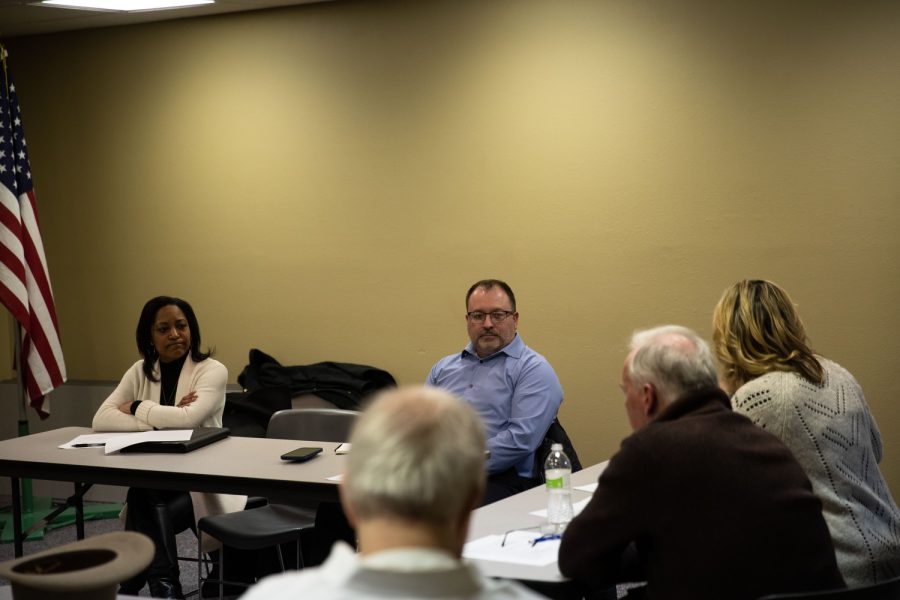Liz Tovar joins JOCO Republicans to discuss DEI
Following the introduction of a bill that would defund the UI’s Diversity, Equity, and Inclusion Office, Liz Tovar, the University of Iowa’s DEI Executive Officer, spoke at the party’s Wednesday night meeting.
Candidates for the Johnson County Board of Supervisors speaks at the Miller Learning Center, Iowa City, on Wednesday, March 8, 2023.
March 9, 2023
The Johnson County Republicans hosted the University of Iowa’s top DEI official Thursday at its weekly meeting amid pending legislation in the Iowa Legislature whether to defund the regent universities’ Diversity, Equity, and Inclusions departments.
Liz Tovar, UI DEI executive officer and associate vice president, spoke to the county Republicans about the repercussions that would entail if the department’s funding was reallocated.
On March 3, Iowa House Republicans introduced House File 616, a bill that would prohibit any state regents universities from using any state funds to sustain, support, or staff a DEI office.
Tovar said if the UI lost its Diversity, Equity, and Inclusion office, students would lose resources and other facets of the university would be affected. She said university accreditation processes also often includes DEI requirements and NCAA participation requires DEI initiatives.
“You know, one of the things that I’ve noticed about the University of Iowa is that every single DEI position in our office has a different purpose,” Tovar said.
Johnson County Republicans Vice Chair Donald MacFarlane said as a Republican his view of diversity is forward-looking and DEI initiatives are typically used to impose viewpoints about identity groups.
MacFarlane said the inclusion of a DEI office further divides the campus by invoking more divisive conversation.
“DEI tends to suppress research, lead to more failure, encourage a sense of entitlement and victimhood, and punish success,” MacFarlane said.
Members of the Johnson County Republicans said an issue with having DEI offices is understanding their purpose when different offices offer complaint and conflict resources.
The UI Office of Institutional Equity handles complaints involving bias, discrimination, harassment, equity, and sexual misconduct.
Kyle Clare, UI student and member of the UI College Republicans, was the only student represented at the meeting, and he said a large component of DEI initiatives revolves around race while continuing to make the campus more segregated.
Clare said the existence of an all-black student Living Learning Community promotes racial segregation. The UI has a Young, Gifted and Black Living Learning Community, but students of all races and ethnicities can live in the residence hall group.
“Would that be a problem if it was a group of white students who have their own floor in the residence halls?” Clare said. “You’re talking about a diverse world and diverse workforce, but you’re allowing there to be homogeny in certain parts of the university.”
Political divisiveness, Clare said, is a common issue on campus that is also being promoted by the DEI office rather than discouraged.
Ultimately, after many differing viewpoints, Tovar and the Johnson County Republicans agreed political polarization and divisiveness are harmful to campus, but both differ on whether the DEI office can prevent each or not.
“I don’t think that the purpose of any DEI office is to tell people how to behave or what to think,” Tovar said. “I think we as a DEI office have thought about the human experience and what it takes to be the best human being you can possibly be and how you support other human beings.”



